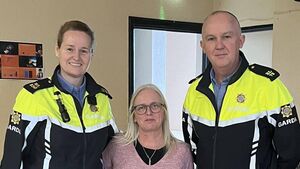Roscommon Gardaí speak at anti-cyberbullying event

Garda Tanya Duffy, Jackie Fox, and Garda John O’Connor at the recent HERO event at Kilbride Community Centre.
The importance of protecting children and young people from bullying was highlighted recently at an event in the county.
Local Gardaí Garda John O’Connor, Roscommon Garda Station, and Garda Tanya Duffy, Boyle Garda Station, were delighted to have been invited to speak at the HERO Bullying event at Kilbride Community Centre on Friday February 16th.
“It was a privilege to meet Jackie Fox who told her heartbreaking story of how her daughter Nicole took her own life after she was bullied relentlessly over a three year period,” the Gardaí said. “Jackie has fought tirelessly to honour Nicole’s legacy by campaigning for anti-cyberbullying legislation which is known as ‘Coco’s Law’ in reference to Nicole. She hopes that this legislation will spare other families the terrible fate visited on hers.”
According to a report by CyberSafeKids published last year, more than 25 per cent of primary school aged children and 40 per cent in secondary school face cyberbullying.
CyberSafeKids annual trends and usage report found that overall, girls were more likely to be victimised online than boys.
Almost two-thirds (62 per cent) of teachers dealt with online safety incidents and 31 per cent of 8-12 year olds are allowed online whenever they want.
CyberSafeKids, Ireland's online safety charity, surveyed over 5,000 8-16 year-olds between September 2022 - June 2023, 93 per cent of 8-12 year-olds have their own smart device, with YouTube (76 per cent) the most popular app, followed by WhatsApp (39 per cent), Tik Tok (37 per cent) and Snapchat (37 per cent).
Online gaming is also popular with young children, with 15 per cent playing over-18 games.
Whilst boys were more likely than girls to play over-18 games (28 per cent v 6 per cent), young girls are more likely to post videos of themselves online (26 per cent v 18 per cent).
The survey of over 5,000 children included secondary school children for the first time.
Almost three-quarters (73 per cent) of 12-16 year-olds said they can go online whenever they want, with 40 per cent posting videos of themselves on social media platforms.
Younger children face more controls at home from parents, but 31 per cent of 8-12 year olds say they are free to go online whenever they want, and 15 per cent of primary school children have no rules in place for going online at home.
Young children are also unaware of how best to protect themselves online with 22 per cent posting videos, and 17 per cent unaware of how to manage privacy settings.
Over a quarter (26 per cent) of all the children surveyed had seen or experienced something online in the last year that “bothered” them (defined as content that scared them, upset them or made them wish they hadn’t seen it) such as sexual or violent content.
Nearly half of the younger children (46 per cent) didn’t tell a parent or trusted adult about this experience, rising to 67 per cent for secondary school children in this position.





